(BPT) - Andrew “Andy” Horn has always had an independent spirit.
“I knew I was going to see the world.”
The oldest of six kids, growing up in Chicago, his desire to travel was sparked at an early age and drove his interest in joining the Navy.
“I was in from 1992 to 1996 during the end of Desert Storm and the beginning of Desert Watch,” said Horn. “I originally thought I would go into the SEAL program, but instead became a search and rescue swimmer. I got to serve my country and see the world, Greece, Italy, Bulgaria, Israel, Egypt, Thailand, Bali and much more.”
Now, two decades and two career changes later, Andy is a retired, married father of three who traded adventures in the Navy for adventures with his family.
“We've been to a lot of places, and we try to bring our girls as much as possible. The experiences are what we really look for.”
But in recent years traveling started to become more difficult and infrequent as Andy navigated life with Parkinson’s disease.
“I was diagnosed in 2015, but obviously Parkinson's is a progressive disease. I would say my symptoms started in early 2013. Some of them were sudden and the one I remember vividly is that my arm stopped swinging on my right side.”
Nearly one million people in the United States and 10 million people worldwide are living with Parkinson’s disease1. Andy spent years trying to avoid his disease until he was unable to manage his tremors, cramping and dyskinesia with dozens of medications a day. That’s when he started exploring deep brain stimulation (DBS) therapy.
“There was a long period, seven or eight years, where I was in some denial about my Parkinson’s diagnosis. I could not button my shirt on my own, even if I didn't have it on,” said Horn. “I started researching DBS as well as discussing with my neurologist and patients who had the surgery. That’s when I realized DBS was the next step for me.”
DBS uses a surgically implanted medical device, similar to a cardiac pacemaker, to transmit electrical signals via slender wires to specific brain targets affected by debilitating neurological disorders like Parkinson's disease. Medtronic Percept™ DBS therapy is the only sensing-enabled† DBS system available, allowing a physician to use data from a patient’s brain activity to personalize their treatment. Andy says Medtronic DBS therapy was the best choice for his lifestyle.

“This is where I need to be so I can travel more, have more independence and be more self-sufficient. I can walk out this door, drive safely home and be okay, and that's because my physician took my data, reviewed it, and adjusted it to what I need at this point in time.”
Now, a year and a half post DBS surgery, Andy’s reclaimed his independence and is using his experience to be a source of inspiration for others navigating life with Parkinson’s disease.
“I was starting to lose my individuality. I was starting to lose things that a lot of people take for granted. I would not change one thing that I did to get here today because it's given me a lot of my life back. Independence is a huge part of this, that’s the biggest thing I got back from DBS. Now, I’m finding ways to help people in the community with my experience, whether it be someone with Parkinson's or a Veteran. I want to help.”
April is Parkinson’s Awareness Month and Medtronic is honoring those affected by Parkinson's with our commitment to continued advancement of DBS therapy. Learn more about DBS by visiting www.medtronic.com/parkinsons.
DBS Therapy is not for everyone, so it's important to talk with your doctor about the benefits, risks, and which device system may be right for you. Not everyone will receive the same results. Some people may experience significant symptom relief from DBS Therapy, and others may experience minimal symptom relief. DBS Therapy requires brain surgery which can have serious and sometimes fatal complications. Once implanted, DBS complications may require additional surgery. Medtronic DBS Therapy may cause new or worsening neurological or psychiatric symptoms. Patients should always discuss the potential risks and benefits of the therapy with a physician. For further information, please call Medtronic at (1-800) 328-0810 and consult Medtronic’s website at medtronic.com/pdsafety. A prescription is required.
† The sensing feature of the Percept™ PC and Percept™ RC systems is intended for use in patients receiving DBS where chronically-recorded bioelectric data may provide useful, objective information regarding patient clinical status. The majority of patients with Parkinson’s disease have an identifiable signal.
References :
1 : Parkinson’s Foundation. https://www.parkinson.org/understanding-parkinsons/statistics. Accessed 3/27/24
UC202411190 EN